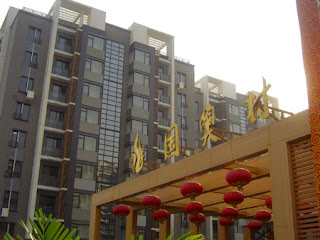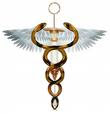 I noticed that there was a vote for real-life experiences, so I thought I should mention what its like living for me here in TEDA. I'll get to all of you culture folk next!
I noticed that there was a vote for real-life experiences, so I thought I should mention what its like living for me here in TEDA. I'll get to all of you culture folk next!At the moment, I live at the TEDA International Hotel, a picture of this is to the left.
I wake up at 6:50 am, get dressed and head downstairs to the lobby. I eat breakfast at a place called the "California Grill" which offers a western continental breakfast or a Chinese style breakfast selection. I find the food to be both enjoyable and filling there. The walls are decorated with commemorative plaques of random movies. You can find romance posters (Titanic) random ones (Terminator) new ones (Spider man 3??) and bizare ones (Harry Potter???) the posters follow no theme except for the fact that they are all western films. I then pocket an apple or pear and make my way out on my walk to the PPG plant. For the first few days here, I took a cab until I got my bearings strait. After I tried walking to the plant one weekend, I've been walking ever since.
My walk begins by jaywalking across a busy street, cutting a parking lot in front of the Friendship Mall (sells foreign goods), Tesco's and KFC and then walking for 40 minutes strait North to the plant. Along the way I pass many industrial facilities, some of which I am not able to guess the purpose of! I pass a pharmaceuticals factory, traffic police station a car repair shop, a Tianjin car factory, KRAFT foods, dormitory for the workers of the factory, a food plant which smells delicious, another car garages, the agricultural bank and finally a coal power plant before I reach the PPG doorstep. The entire 40 minute walk is on a street that is lined on both sides by trees. I have never seen so much urban greenery before and its great! It shades me from the morning sun and keeps my walk cool at all times.
I then start work at the plant where I job-shadow my various colleagues and work on my own environmental strategies on how to make PPG's operations greener (they were already quite green before I even got here!). I don my safety shoes issued by the plant (steel toed - non-stick, and tough shoes for entering the factories) so that I am ready for whenever a plant tour invitation pops up. PPG is great in that it provides a shuttle bus service for all employees living in Tianjin. This is because the majority of the plant's workforce lives in Tianjin like many of the factories around here. A free lunch for all employees is also provided. It is served in compartmentalized metals trays and features different selections every day. What I really appreciate is the ample white rice and absence of western food. I swear that I can barely survive without rice! I resume work in the afternoon and by 4:30 its time to go.
Occasionally, I carpool with a colleague back to my hotel but most often I prefer to walk. I pass all sorts of interesting places and people. For example, there are mobile bicycle repair shops set up by people who pedal around on large three wheeled bikes. These three wheelers with a huge box on the back are a mobile garages for bicycles with problems. They can patch popped tires in minutes and also sell you a decent selection of bicycle wares. Their services are popular as I see at least 5x more cyclists than cars on my way to work. There are HUGE cycle lanes here which makes China seem far more advanced in cycling culture than Canada. I've had my fair share of cycling in Canada, weaving in and out of cars and risking one's life daily. These lane-wide cycle areas are a far safer way for the cyclists to travel. They are also separated from the cars by a divider of trees. When I'm back in the friendship mall area, I duck into a side alley for dinner. I found a Chinese restaurant which has a printed English menu which you have to ask for. Its great as there is not a single laowai in sight, the food is authentic and not to mention very well-priced! I used to eat dinners for 30 RMB a day ($4) but this place helped me get it down to 10RMB or Less. My record was a 3 RMB dinner, let's see if I can beat that someday!
I then head back to my hotel room where I have a flexible schedule. Some days I go the gym and do some exercise while watching Chinese television. I also watch Chinese cartoons with Chinese subtitles to help my reading speed. Of course, I blog and check emails as well. I've been trying to teach myself Chinese as well via web-links and a book I brought from Canada. The progress is slow but its getting there! Today I'll be leaving this place behind though as I am moving to a new place in Tianjin city. Soon, I too will be taking that big blue PPG shuttle bus.
Photo source:
http://www.holidaycity.com/teda-international-tianjin/index.htm





























